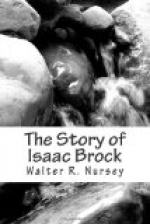“An Indian, or Indians collectively,” said Henry, pausing before he answered,—“I speak from personal experience only—are faithful so long as you keep absolute good faith with them. In this particular they are no different from white people; but never deceive them, even in trifles, and never subject them to ridicule. Then, if you treat them with consideration, you can reasonably depend upon their individual loyalty. They expect a lot of attention. Yes! an Indian is naturally grateful, probably far more so than the ordinary white man, and seldom forgets a kindness. Should you come into closer contact with the redman, Colonel, as I have a presentiment you will before long, never forget that an Indian, by right of his mode of life, is deeply suspicious and painfully sensitive. He has a keen sense of humour, however, and is quick to discern and laugh at the weak points of others, which, until you understand his language, you will be slow to suspect. On the other hand, he won’t stand being laughed at himself or placed in a foolish position. For that matter, who can? Occasionally you will meet a savage with strangely high principles. Among the redskins there is a proportion of good and bad, as there is in all races, but less crime, under normal conditions, than there is among the whites. So, summing up his vices and virtues, the North American Indian, allowing for heredity and surroundings, differs little from ourselves.”
“They are brave,” interrupted Brock.
“Oh, yes,” said Henry, “splendidly reckless of life. The courage of the fatalist I should say. You see, they are so constantly on the war-path that fighting is a compulsory pastime.”
“Still,” said Brock, “with what daring they fight for their homes.”
“True, Colonel,” retorted Henry, “but when it comes to fighting for home, a hummingbird will defend its nest. Their peculiar traits are largely the result of a nomadic life and tribal strife, hence, their duplicity. Superstition influences them greatly, as it does all savage races. In one respect they are at least superior to some of our own people—I refer to their treatment of their children. Their lovingkindness is pathetic. Contact with civilization, as you may discover, develops at first all their bad qualities, for they are apt imitators, so when the pagan Indian meets a trader without a conscience—and there are some, you know—why, he is not slow to adopt the bad Christian’s methods.”
[Illustration: BROCK’S COCKED HAT]
CHAPTER XI.
LITTLE YORK, NIAGARA, AMHERSTBURG.
In common with most great men, Brock found distraction in trifles. For weeks prior to leaving Quebec all kinds of gayety prevailed. A visit from Governor Gore of Upper Canada, and the arrival of the fleet from Guernsey and two frigates from Portsmouth, gave a fillip to society. Races, water-parties and country picnics were the order of the day. Our hero’s contribution consisted of a banquet and grand ball. He had his own troubles, however, that even the versatile Dobson could not overcome, and he roundly scolded his brother Irving for not sending him a new cocked hat.[2]




